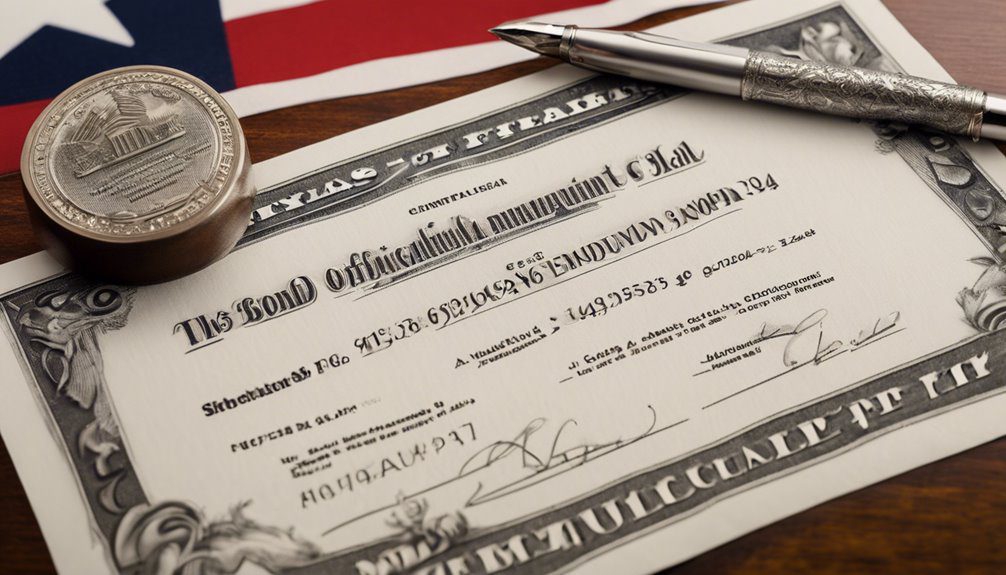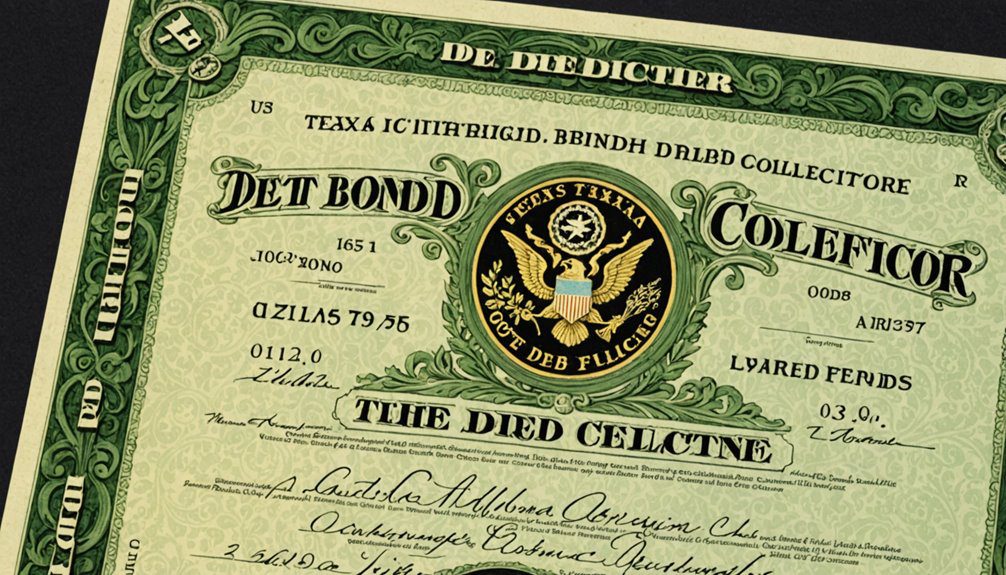If you're involved in debt collection in Texas, understanding the Third Party Debt Collector Bond is essential. This bond not only protects consumers from potential misconduct but also establishes a framework for ethical practices within the industry. You might wonder how this bond impacts your operations or what the specific requirements entail. As you consider these factors, it's vital to recognize the implications of compliance and the potential consequences of neglecting this important aspect of your business. What do you need to know to navigate this landscape effectively?
Definition of Third Party Debt Collector Bond

A Third Party Debt Collector Bond is a type of surety bond that protects consumers from unethical practices by debt collectors. When you hire a debt collector to recover money, they must comply with specific regulations. This bond ensures that if they engage in dishonest or harmful behavior, you have financial recourse.
Essentially, it acts as a safety net for you and other consumers, guaranteeing that the debt collector operates within the law.
If a debt collector violates the terms of their bond, you can file a claim against it. This means you won't have to bear the financial burden if they act unethically. The bond serves as a guarantee that the collector will adhere to fair practices, which includes following the Fair Debt Collection Practices Act.
It's important to understand that obtaining this bond is often a requirement for debt collectors to operate legally in Texas. They must demonstrate their commitment to ethical standards and accountability.
Importance of the Bond
Why is the Third Party Debt Collector Bond so crucial for consumers? This bond acts as a safety net for you, ensuring that debt collectors adhere to state regulations and ethical standards.
When a collector holds this bond, they demonstrate their commitment to fair practices in handling your debts. If they violate these rules, the bond provides you with a way to seek compensation for any wrongdoings, such as harassment or fraud.
Having this bond in place also boosts your confidence in dealing with debt collectors. You know that they're required to follow the law, and if they don't, there are consequences. This level of accountability helps create a more transparent and trustworthy environment for everyone involved.
Additionally, the bond can deter unscrupulous behavior, as debt collectors understand they can face financial repercussions for unethical actions.
Eligibility Requirements

To operate as a third-party debt collector in Texas, you must meet specific eligibility requirements that ensure you're qualified and trustworthy.
First off, you need to be at least 18 years old, demonstrating that you possess the maturity necessary for this role. A clean criminal record is also essential; any felony convictions may disqualify you, especially those related to fraud or dishonesty.
You'll also need to have a good credit history. Lenders often review your creditworthiness to make sure you're financially responsible.
Moreover, you have to register your business with the state and obtain a business license, ensuring that you comply with local regulations.
It's crucial to have proper training and knowledge about debt collection laws to operate legally and ethically. Familiarity with the Fair Debt Collection Practices Act and Texas laws is a must.
Additionally, you may need to provide proof of bonding, which protects consumers and maintains your credibility in the industry. This bonding process is essential to ensure compliance with debt management regulations and industry standards.
Lastly, you should be prepared to submit any necessary documentation that proves your eligibility, which may include financial statements and background checks.
Meeting these requirements is vital for your success as a third-party debt collector in Texas.
Application Process
When you're ready to apply for a Texas third-party debt collector bond, the process involves several key steps that ensure compliance with state regulations.
First, gather your necessary documents, including your business license, identification, and any financial statements required by the bonding company. This information helps the surety assess your application.
Next, research and select a reputable bonding company. It's crucial to find one that specializes in debt collector bonds since they'll understand the specific requirements.
Once you've chosen a company, fill out their application form, providing accurate and detailed information. Be prepared to answer questions about your business practices and financial history.
After submitting your application, the surety will review it and may conduct a background check to evaluate your creditworthiness.
If approved, you'll receive a quote for the bond premium, which is the cost of securing the bond. Additionally, it's important to ensure that your application demonstrates compliance with laws to facilitate a smooth approval process.
Bond Amount and Premiums

Once your application is approved, you'll need to focus on the bond amount and premiums. In Texas, the required bond amount for third-party debt collectors typically ranges from $10,000 to $100,000, depending on your business's specific needs and regulatory requirements. This bond amount serves as a financial guarantee that you'll adhere to state laws while collecting debts.
The premium you pay for the bond is a percentage of the total bond amount, generally ranging from 1% to 15%. Factors influencing your premium include your credit score, financial history, and business experience. If you have a strong credit score and a solid business background, you could secure a lower premium, which helps reduce your overall costs.
It's crucial to shop around and compare quotes from different surety bond providers. This can help you find the best rate and terms that suit your financial situation. Additionally, understanding the different types of Texas Surety Bonds can aid in determining which bond is best suited for your needs.
Regulatory Compliance
Ensuring regulatory compliance is essential for your success as a third-party debt collector in Texas, as it helps you avoid legal issues and maintain your reputation. You need to familiarize yourself with the Texas Finance Code, particularly Chapter 392, which outlines the rules governing debt collection practices.
Adhering to these regulations not only protects you from potential fines but also establishes trust with clients and debtors alike. Make sure you're licensed and bonded, as this is a legal requirement to operate in Texas.
Regularly update your knowledge about any changes in state or federal regulations, as they can impact your business practices. Implementing proper training for your staff is crucial; they should understand the laws and ethical standards that govern debt collection.
Additionally, compliance with bonding requirements enhances your agency's credibility and trustworthiness in the industry. Keep accurate records of your communications and transactions. This documentation serves as a safeguard in case of disputes or audits. Additionally, you should have a clear process for handling complaints, as prompt resolutions can mitigate further legal complications.
Consumer Protection Benefits

Regulatory compliance not only safeguards your business but also enhances consumer protection, which is increasingly important in today's debt collection landscape. When you adhere to the regulations governing third-party debt collection, you're ensuring that consumers are treated fairly and respectfully. This builds trust and fosters a positive relationship between you and those you collect from.
By obtaining a Texas Third Party Debt Collector Bond, you're reinforcing your commitment to ethical practices. This bond acts as a safety net for consumers, providing them with a means to seek compensation if your business fails to comply with state laws. It demonstrates that you take your responsibilities seriously, which can set you apart from competitors who may not prioritize consumer rights.
Additionally, compliance helps you avoid deceptive practices that can lead to consumer distress. When consumers feel protected, they're more likely to engage in open communication about their debts, which can lead to better outcomes for both parties.
In essence, prioritizing consumer protection not only enhances your reputation but also contributes to a more ethical and sustainable debt collection environment. So, embracing these protections is beneficial for both your business and the consumers you serve.
Consequences of Non-Compliance
What happens if you fail to comply with the regulations surrounding debt collection? You could face serious consequences that can impact your business and reputation.
Regulatory bodies, such as the Texas Office of Consumer Credit Commissioner, take violations seriously. If you're found non-compliant, you might receive fines, penalties, or even cease-and-desist orders, which can halt your operations.
Additionally, your surety bond could be affected. If consumers file claims against your bond due to your unethical practices, you'll need to cover those claims out of pocket until resolved. This can lead to increased costs and could make it harder for you to obtain bonds in the future.
Your reputation is also at stake. Negative reviews or complaints can damage your credibility and make it difficult to acquire new clients.
In the long run, non-compliance can lead to legal actions, resulting in further financial strain. It's crucial to adhere to the regulations to avoid these pitfalls and ensure your debt collection practices are ethical and lawful. Insurance broker bonds not only protect consumers but also serve as a financial guarantee for compliance with laws and regulations.
Maintaining compliance not only protects you but also fosters trust with consumers and clients alike.
Tips for Debt Collectors

To succeed as a debt collector, it's essential to prioritize ethical practices and effective communication. Start by understanding the laws governing debt collection in Texas. Familiarize yourself with the Fair Debt Collection Practices Act and the Texas Debt Collection Act to ensure you're compliant.
Next, practice active listening when communicating with debtors. Show empathy and respect; this can help build rapport and encourage them to work with you. Always be clear about the amount owed, the original creditor, and the consequences of non-payment.
Moreover, maintain detailed records of all interactions. Document dates, times, and content of conversations, as this can protect you if disputes arise. Use positive language and focus on solutions rather than threats.
Be patient; sometimes, debtors need time to gather funds or make arrangements. Offer flexible payment options to accommodate their situations, which can increase the likelihood of successful collections.
Lastly, keep improving your skills. Attend workshops and training sessions to stay updated on best practices and regulations.
Conclusion
In summary, the Texas Third Party Debt Collector Bond is essential for ensuring ethical practices in the debt collection industry. By securing this bond, you not only protect consumers but also enhance your credibility as a debt collector. Remember to stay informed about the eligibility requirements and maintain compliance with regulations to avoid penalties. By prioritizing ethical standards, you'll foster trust with consumers and contribute to a more accountable debt collection environment.


